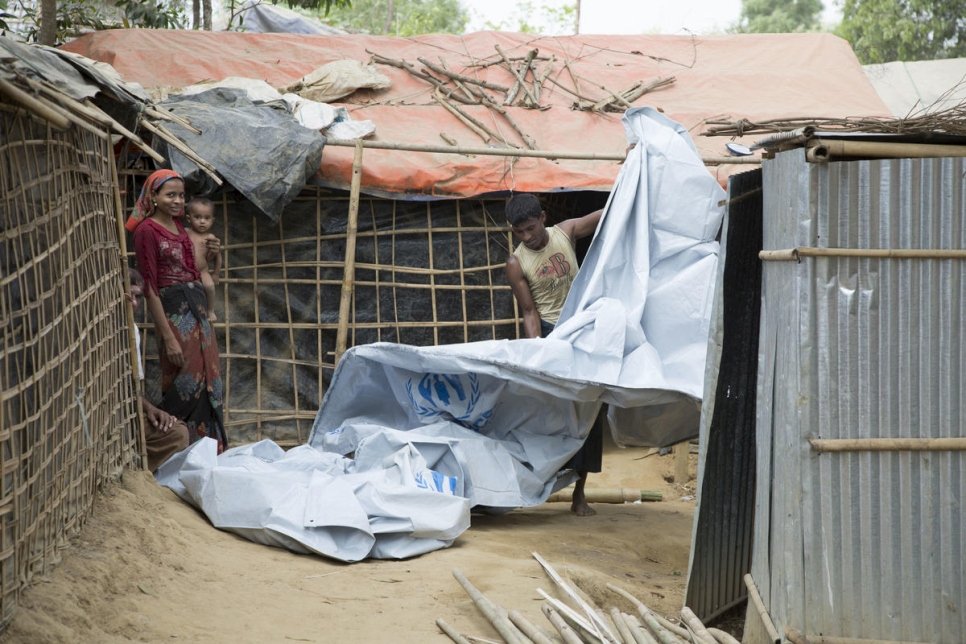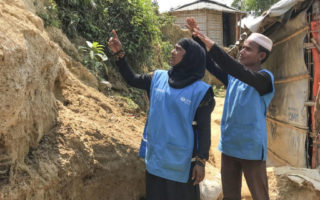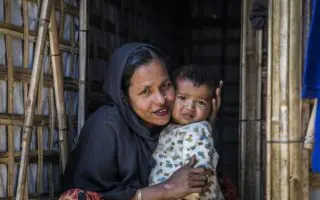
Rohingya refugees prepare their shelters in Cox’s Bazar to withstand monsoon rains, March 2018. © UNHCR
This is a summary of what was said by UNHCR spokesperson Andrej Mahecic – to whom quoted text may be attributed – at today’s press briefing at the Palais des Nations in Geneva.
UNHCR, the UN Refugee Agency, warned today of life-threatening consequences if annual monsoon preparations cannot be completed on time in Bangladesh amid the global outbreak of COVID-19. As countries around the world fight the pandemic, the coming of the monsoon rains risks worsening the already difficult situation of refugees in Bangladesh.
In Bangladesh, so far there are no confirmed cases of COVID-19 infection among the Rohingya refugee population. Despite this, both host communities and refugees in Cox’s Bazar, with a population density one and a half times higher than New York City, are considered to be among the most at risk globally in this pandemic. The area is also seasonally prone to both landslides and flash flooding.
In 2019, during the heaviest monsoon downpours in September, over 4,000 households were temporarily displaced in the camps in Cox’s Bazar, and more than 16,000 people affected. Thanks to mitigation measures in place, the damage was far less than the previous year. Refugees remain at the centre of preparedness planning and response, through teams of some 3,000 trained volunteer first responders, leading their own communities and these life-saving measures.
Annual monsoon preparations, however, have been impacted by the suspension of disaster risk reduction (DRR) efforts, including improvements to drainage systems and slope stabilization work. Similarly, the relocation of refugees living in areas at high risk of flooding and landslides has also been delayed. Delivery of supplies has also been challenging, as the COVID-19 related “lockdown” has impacted road transport.
While humanitarian operations in the camps have been scaled back to only the most critical activities, the distribution of “tie-down kits” that reinforce refugee shelters against high winds continues. Post-disaster kits and emergency relief items have been pre-positioned in case of emergency. Emergency Preparedness and Response Teams (EPRTs) are also on standby to mobilize and deploy as necessary and permitted to operate in case of extreme weather.
To address the risks of a potential outbreak of coronavirus in the camps, the Government of Bangladesh, together with UNHCR and partners, has ensured the inclusion of Rohingya refugees in its national response. UNHCR and partners have launched construction of isolation and treatment facilities, with the goal of ensuring the availability of 1,900 beds to serve both refugees and host communities in the District in the coming weeks. Information-sharing has been expanded through a network of more than 2,000 community volunteers, religious leaders and humanitarian workers.
While it is vital to prioritize public health-related preparations in the camps at this time, cyclone and monsoon preparedness activities must also continue. Both together will ensure that refugees have safe and sanitary living conditions in an additional, potential public health emergency.
To ensure preparedness measures can proceed safely, personal protective equipment (PPE) is desperately needed, given the magnitude of the increased demands. The large-scale procurement and distribution of PPE is vital to ensure that COVID-19 does not take hold and spread rapidly. Overall, the 2020 Joint Response Plan for the Rohingya Humanitarian Crisis sought some US$877 million to meet the most critical needs before the COVID-19 pandemic began. To date the JRP is only 16 per cent funded.
In the midst of such a global public health crisis, it is clear that all of us can only be safe if we ensure that everyone is kept safe. COVID-19 does not discriminate. We must make every effort to ensure that the possible spread of the virus and the coming monsoon season do not exacerbate the already highly vulnerable situation of the Rohingya refugees in Bangladesh. UNHCR is urging the international community to stand in solidarity with refugees and IDPs to avert a looming mix of natural and public health disaster.
For more information on this topic, please contact:
- In Cox’s Bazar, Louise Donovan, donovan@unhcr.org, +880 18 4732 7279
- In Bangkok, Catherine Stubberfield, stubberf@unhcr.org, +66 65 929 8062
- In Geneva, Andrej Mahecic, mahecic@unhcr.org, +41 79 642 97 09
- In New York, Kathryn Mahoney, mahoney@unhcr.org, +1 347 443 7646
Originally published by UNHCR on 21 April 2020




